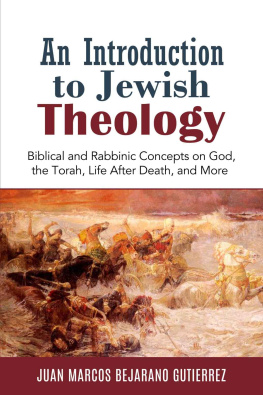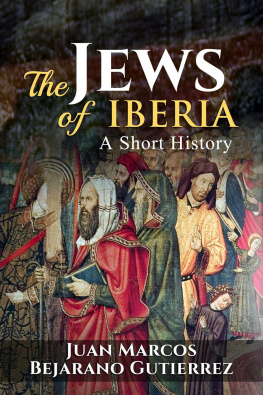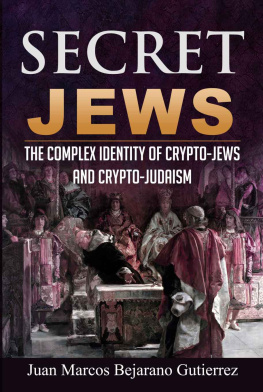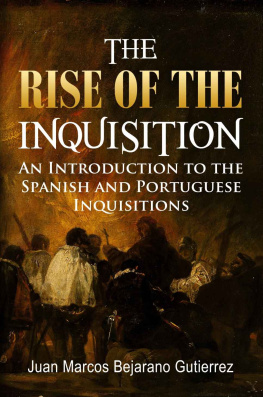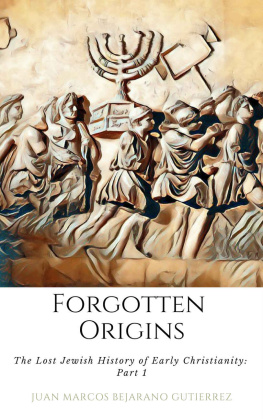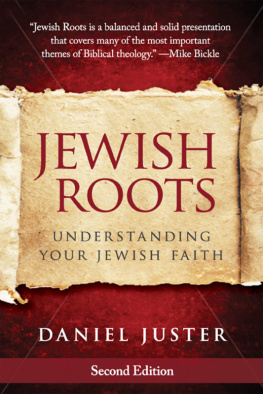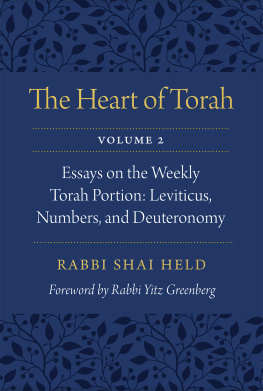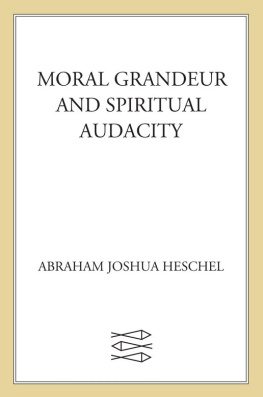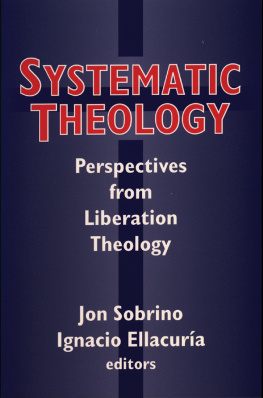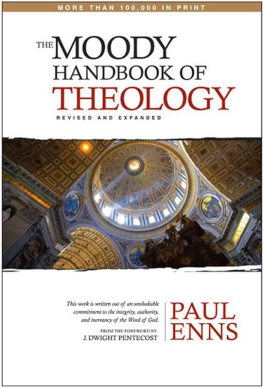An Introduction to Jewish Theology
Biblical and rabbinic Concepts on God, the Torah, Life after Death, and mOre
Juan Marcos Bejarano Gutierrez
Yaron Publishing
Grand Prairie, Texas
Copyright 2019 by Juan Marcos Bejarano Gutierrez
All rights reserved. No part of this publication may be reproduced, distributed or transmitted in any form or by any means, including photocopying, recording, or other electronic or mechanical methods, without the prior written permission of the publisher, except in the case of brief quotations embodied in critical reviews and certain other noncommercial uses permitted by copyright law. For permission requests, write to the publisher, addressed Attention: Permissions Coordinator, at the address below.
Juan Marcos Bejarano Gutierrez /Yaron Publishing
701 Forest Park Place
Grand Prairie, Texas 75052
www.CryptoJewishEduation.com
Book Layout 2017 BookDesignTemplates.com
Ordering Information:
Quantity sales. Special discounts are available on quantity purchases by corporations, associations, and others. For details, contact the Special Sales Department at the address above.
An Introduction to Jewish Theology/ Juan Marcos Bejarano Gutierrez. 1st ed.
ISBN 9781091657908
Contents
To my friend
Omar Asaf
And thou shall love the Lord thy God with all thine heart I explain with all thine heart to mean with all the powers of thine heart, that is, with all the powers of the body, for they all have their origin in the heart; and the sense of the entire passage is; make the knowledge of God the aim of thy actions
Rabbi Moses ben Maimon, Guide for the Perplexed
Introduction
Rabbi Byron L. Sherwin, zl once noted that many Jews seemed convinced that since traditional Judaism is focused on Halachah , i.e., the practical observance of the commandments, any discussion about theology is superfluous. Some go as far as to say that traditional Judaism does not have a theology. The problem, of course, is that any discussion about God, the Torah, and the people of Israel immediately raises fundamental questions such as which God are we discussing, how was the Torah revealed, who are the people of Israel, etc. All these questions are the domain of theology, the study of religious beliefs.
Perhaps part of the issue with the aforementioned assumptions is the lack of creeds or doctrinal statements along the lines of those embraced by Christianity. Jewish theology is multifaceted and does not reflect the systematic nature of Christian thought. This fact does not diminish its depth, however.
At first glance, the topics included in this volume may appear to be a series of disjointed and independent essays. These topics, in my opinion, cover recurring themes and questions that define much of Jewish theology. Any attempt to address Jewish theology comprehensively would require many volumes. This work is focused on a few key concepts only. It is intended for the beginner but hopefully contains sufficient information to also be of interest to the more advanced reader and prove the starting point towards greater study.
Chapter one titled Creation, explores the differences between Mesopotamian worldviews and the Bibles notion of Gods creation of the world. Judaism and in its earlier form, Israelite religion, did not arise in a vacuum. Similarities exist in the foundational stories of various neighboring cultures, but the differences found in the Torah reveal the heart of Jewish faith.
The second chapter is titled Jewish Concepts Concerning God and briefly discusses ideas of God in biblical, rabbinic, and Kabbalistic thought. There are conflicting images of God in the Bible, and the developments in Jewish thought sought to address these differences.
The third chapter is titled Who is a Jew? It addresses the age-old question of Jewish identity from the vantage point of classical rabbinic perspectives as well as from alternate points of view found in modern Jewish movements. The strengths and the weaknesses of these different views are briefly discussed.
The fourth chapter, Jewish Views of the Afterlife, discusses the fascinating topic of life after death in biblical literature as well as in the later works written during the Second Temple Era, the rabbinic period, and into the medieval and modern periods.
Chapter five titled Polarity in Jewish Though t delves into the subject of the Jewish alternative of descriptional theology to theological systems characterized by an emphasis on definition and classification.
The next chapter, titled The Revelation of the Torah discusses the giving of the Torah at Sinai and covers the idea of the Torah as it is understood in traditional and non-traditional Jewish movements. A brief discussion on historical criticism is also included. In addition, the limits of prophetic revelation in the legislative process are also discussed.
The subsequent chapter, The Land of Israel , surveys biblical and rabbinic perspectives on Gods unique relationship to the Land of Israel.
The last chapter titled Tikkun Olam address misconceptions regarding this prevalent but largely misunderstood idea. Tikkun Olam is often understood as a Jewish commitment to social justice. Its original meaning and the very different goals it envisions are deliberated.
Chapter 1
Creation
T he first chapter of the book of Genesis recalls the story of creation. But it provides far more than merely an Israelite cosmology. It offers an understanding of various Near Eastern cosmologies or the remnants of the former still existent in the memory of Israelite society. More importantly, it provides a response to these ideas, yet it does so as Umberto Cassuto describes in a manner that is tranquil, undisturbed by polemic or dispute. It provides the foundation for Jewish theology.
Near Eastern Cosmologies
Before reviewing the specific manner in which Genesis addresses the claims of competing Near Eastern cosmologies, a brief assessment of the former is appropriate. They typically begin with a theogony, a story relating the origins of the gods and include a genealogy of those deities that existed before the worlds creation. They also generally include the various conflicts and wars between a variety of deities which ultimately lead to the creation of the earth and the heavens.
One of the most common creation stories of the Near East is the Babylonian epic Enuma Elish . In this story, nothing existed before earth and heaven were formed, except water. This is a theme which is echoed in the Biblical account which states:
Now the earth was formless and empty, darkness was over the surface of the deep
The two most critical generative elements were identified with the monstrous Apsu, the primordial sweet water ocean embodied as a male, and his female consort, Tiamat , represented by the primordial saltwater ocean. From the mingling of these two bodies of waters, the gods were given birth. This process continued several times leading to the rise of additional gods.
The rise of the gods and their subsequent revelry disturbs the precious tranquility previous experienced by Apsu and Tiamat . In order to recapture their previous tranquility, they attempt to destroy the gods. The plan, however, is frustrated by Ea , the earth-water god. The stories continue with Tiamat marshaling her forces to do battle against the gods, with the god Marduk as their head.
Marduk has agreed to lead the gods against Tiamat, is granted sovereignty over the universe in exchange for his leadership. Marduk proves victorious in his battle against Tiamat and slays her. Tiamat is sliced in two, and one half of her body creates the firmament of heaven, while the other serves as the foundation of their earth.
The Purpose of the Enuma Elish
The purpose of the Babylonian Epic is rooted in its explanation of the origin of the gods familiar to the people of Mesopotamia. It also provided an explanation of the origin of the universe. Lastly, it provided the structure reflected in a Babylonian society that explained the nature and purpose of man as a servant or slave to the gods and to the state. As the scholar, Narhum Sarna states:
Next page
